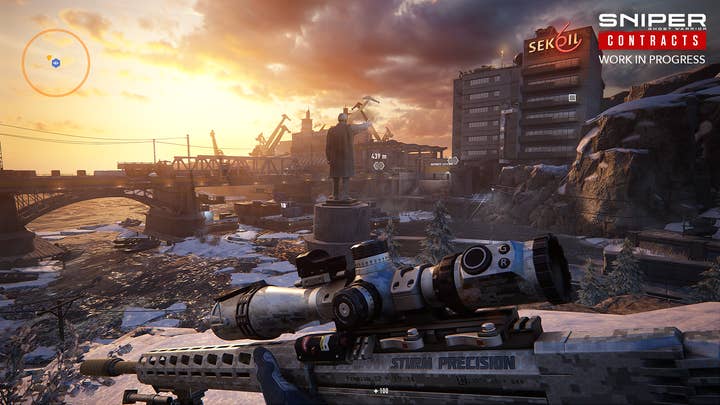"Expectations for full-price games is very high. You need a large budget to have a chance"
CI Games CEO Marek Tymiński reflects on the struggles of Sniper Ghost Warrior 3 and how upcoming sequel Contracts will rectify this
Recovering from a big bet that didn't quite pay off can be one of the toughest things a games company has to go through. There's an expectation of constant growth, that your titles will get bigger and better each time, but sometimes the scope can expand beyond your capabilities as a studio.
This was the case with Sniper Ghost Warrior 3, the 2017 open-world first-person shooter by Polish developer CI Games. The game was more ambitious than anything the studio had made to date, yet didn't have the impact or sales the company needed.
Just three months after its launch, CI Games admitted it was a "big mistake" in aiming for the AAA shooter space, trying to stand alongside titles developed by bigger teams with much bigger budgets.

The game was by no means a failure, but even the one million sales it managed did not prevent CI Games from significantly downsizing a year later. CEO Marek Tymiński tells GamesIndustry.biz the total sales are now close to 1.5 million units, which -- while still not up to the company's own expectations -- is "not a bad result."
In 2019, the series returns with Sniper Ghost Warrior Contracts, and Tymiński is confident the game will rectify the mistakes made with its predecessor, with CI Games determinedly avoiding comparison with AAA games.
"We have fixed most of the problems that SGW3 had, but competing with major games is tough and requires large teams," he says. "Our internal studio is only around 35 people.
"The team has been working with multiple partners, but still this is AA scope and we feel way more comfortable with that."
The biggest change is that SGW Contracts has dropped the open world and offers a more condensed experience. There are now five sandbox maps, each with five contracts or missions to be carried out.
"I hope a lot of people will say this is the game the previous ones were supposed to be"
"Don't get me wrong -- Contracts is still a bigger game," Tymiński says. "The major difference this time is that the game is based around contracts, with a choice of the order you execute them."
This in itself presents interesting possibilities, just as an open-world game might. One contract might yield intel that will help you on another, but do the other first and players will be unaware of this useful information.
Tymiński is also keen to emphasise the amount of work that has gone into improving the gameplay from SGW3. For one thing, dropping the open world has cut down on loading times.
"The team has improved a lot of things, from the new sniping system, a more optimised engine with upgraded rendering, better bullet cams, a completely new system of dismemberment, and more advanced AI," he says.
"This has been a iterative process so a lot of issues have been already solved with further support of SGW3. Overall, SGW Contracts is a much better game."
The contracts system sounds similar to the structure of IO Interactive's rebooted Hitman series, with a handful of maps lending themselves to ongoing content updates and new missions that will keep players engaged. Has the studio been watching this series closely?
"Hitman is a great game but honestly it wasn't our main inspiration," says Tymiński. "The contract system just fits so well to our franchise and it felt like a natural step forward."
Another series CI Games will have been monitoring is the rival Sniper Elite games from UK developer Rebellion. While Sniper Ghost Warrior, by the developer's own admission, stumbled with SGW3, Sniper Elite has continued to reach new players through Xbox Game Pass and a Switch version of Sniper Elite 3.
"Some of the new things we did with Sniper Contracts make it more tactical and more authentic than [Sniper Elite]"
"Some of the new things we did with Sniper Contracts make it more tactical and more authentic than the other franchise," says Tymiński. "One good example is we completely dropped the 'red dot' while sniping. That made the games too arcadey, in our opinion.
"The first person perspective is also something that makes the game more immersive. And a lot of that is based on feedback coming from the community."
Perhaps understandably, CI Games isn't openly sharing its expectations for Contracts at this point. But as the game's November 22 release date approaches, Tymiński is hopeful that the game will do well.
"I also hope a lot of people will say that this is the game the previous games were supposed to be," he adds.
Having dialled back to a AA scope for its next game, does CI Games still hope to one day attempt a AAA-style product again? Perhaps Contracts is the first step on the road to growing the studio to the point where it could deliver the open-world sniper game it wanted to with Ghost Warrior 3.
"No, the studio ambition is to make great games but stay with the scope we can control considering the size of the team," says Tymiński. "I think the AA segment is growing and has a lot of potential.
"Some of the elements of the games have to stand up in comparison to AAA, but the major difference is the scope."
And with major AAA publishers like EA and Ubisoft doubling down on live-service games and multiplayer affairs, the market is potentially wide open for AA developers such as CI Games to be the only companies offering these types of focused experiences. Tymiński believes there's "a lot of truth" in this, and points to the growth in digital sales as another much needed shot in the arm for the AA space.
He concludes: "The level of expectations people have today from full price games is very high and you really need to have large budget to even have a chance."


